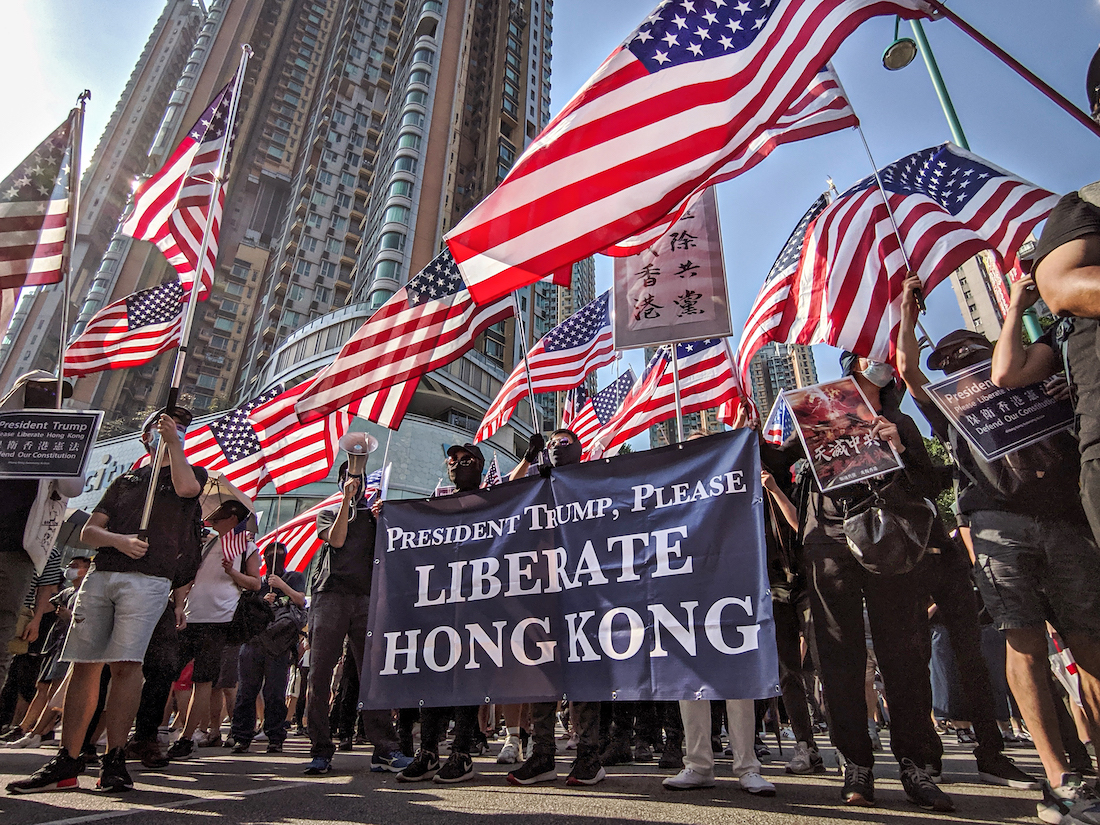American exceptionalism cannot be appreciated without contrast. Compare these two scenes: On Wednesday night throngs of rioters rampaged through Seattle’s Capitol Hill district, inflicting “massive amounts of property damage, looting,” and “arson” without sustaining a single arrest. One night earlier in Hong Kong, police arrested peaceful protesters so petrified of breaking its Orwellian new “national security law” that they held blank white placards.
Few images could throw the principles enshrined in the Declaration of Independence into starker relief. On one hand, the former denizens of CHOP/CHAZ mingle with Antifa and Black Lives Matter™ protesters to advocate a racialized form of Marxism while violating bona fide laws (and public decency standards) with impunity. On the other, democratic advocates – including elected officials – find themselves caught in the dragnet for committing thoughtcrime.
At least two political leaders were arrested Tuesday. Police said that Ted Hui illegally challenged them for summarily searching multiple district councillors. Rayman Chow held a banner that repeated the (well-founded) allegation that police let a private mob beat protesters last July 21 – a thought now illegal under the national security law, which makes it illegal to provoke “hatred” of the national or local government.
The crackdown only builds on the culture of intimidation and silence imposed on the island against its inhabitants’ wishes. The Hong Kong Police Force rounded up 370 protesters on the day the law took effect, July 1 – 23 years to the day the UK ceded authority over the island to China. The UK agreement, signed by Margaret Thatcher, required Beijing to maintain a “one country, two systems” policy which respects the democratic, economic, and human rights that Hong Kong’s citizens already enjoyed. The People’s Republic of China has steadily reneged on that pledge.
In their oppression, Hong Kong has embraced the Declaration of Independence – one of the very founding documents BLM and the 1619 Project brand as systematically racist, oppressive, and unacceptable. At least one of the women arrested literally wrapped her sign with the American and UK flags.
#NationalSecurityLaw in effect. #HKPolice further arrested a female for showing a material with #HKIndependence slogan in #CausewayBay, Hong Kong. #HKPolice will take resolute enforcement action in accordance with #NSL. pic.twitter.com/mTmJWt8Z8m
— Hong Kong Police Force (@hkpoliceforce) July 1, 2020
Which brings us back to American exceptionalism. The most intense crackdown to date coincided with the Fourth of July weekend. So many of the legitimate grievances held in Hong Kong echo the Declaration of Independence.
In the longest section of that charter of the American experiment, Thomas Jefferson indicted King George III for numerous violations of the colonists’ rights. The list includes these recriminations:
He has combined with others to subject us to a jurisdiction foreign to our constitution, and unacknowledged by our laws.
The National People’s Congress in Beijing subjected Hong Kong to a terrorizing new law, simultaneously vague and comprehensive. “The enactment and imposition of this national security law constitute a clear and serious breach of the Sino-British Joint Declaration,” said UK Prime Minister Boris Johnson. “It violates Hong Kong’s high degree of autonomy, and it’s in direct conflict with Hong Kong’s Basic Law.” Although Hong Kong must establish its own police to enforce the law, Article 65 vests “the power of interpretation” of the law in Beijing.
And the Chinese Communist Party does not merely claim jurisdiction over Hong Kong residents. Article 38 states that police can punish violations “by a person who is not a permanent resident” of Hong Kong, apparently including U.S. citizens who visit the island.
For quartering large bodies of armed troops among us.
The law establishes a security force on the island controlled entirely by Beijing. Articles 55 and 56 allow forces under control of the mainland to assert jurisdiction over any case they deem “serious” or “difficult.”
For depriving us in many cases, of the benefit of Trial by Jury.
Article 46 of China’s national security act allows rulers to deny the accused a trial by jury. Hearings may be conducted in secret (Article 41) and tried by a judge who was personally appointed by Hong Kong’s chief executive (Article 44).
For transporting us beyond Seas to be tried for pretended offences.
Article 56 allows trials to be held in the PRC, presided over by Chinese judges. As for the “pretended offences,” the law defines “subversion” broadly enough to include everything from overthrowing the government to “seriously interfering in, disrupting, or undermining” any government undertaking.
The Chinese government’s silencing of dissent, its denial of the island’s autonomy, and its quashing of citizens’ redress of grievances constitute material violations of the Declaration of Independence – to say nothing of the U.S. Constitution and Bill of Rights. For this reason, great Americans have always viewed our founding document as the fountain of worldwide liberation.
Its belief in God-given rights upholds the notion that all human persons were created for freedom. President-elect Abraham Lincoln said that the Declaration of Independence “gave liberty, not alone to the people of this country, but, I hope, to the world, for all future time. It was that which gave promise that in due time the weight would be lifted from the shoulders of all men.”
Since the foundation of these rights rests upon the recognition of a Higher Power, people of faith – and Americans generally – would do well to ponder the questions asked by the recent report of the U.S. Commission on Unalienable Rights: “To what extent do unalienable rights rest on the work of a creator Deity? Can faith in such rights be sustained without faith in God?” As Americans plumb the origins of those rights, they should gain a greater appreciation of them as they are acknowledged or denied around the world.
At a minimum, comparing America’s founding documents with the collectivist system that enabled Hong Kong’s violent police repression should make U.S. activists cease their efforts to replace the former with the latter.
(Photo credit: Studio Incendo. CC BY 2.0.)

